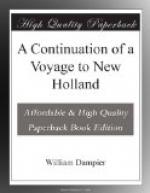In the evening, being near the west end of Bouro, we saw a brigantine to the north-west of us, on the north side of Bouro, standing to the eastward. I would not stand east or west for fear of coming nigh the land which was on each side of us, namely Bouro on the west, and Keelang on the east. The next morning we found ourselves in mid-channel between both islands; and having the wind at south-west we steered south-south-east, which is right through between both. At 11 o’clock it fell calm; and so continued till noon; by that time the brigantine which we saw astern the night before was got 2 or 3 leagues ahead of us. It is probable she met a strong land-wind in the evening which continued all night; she keeping nearer the shore than I could safely do. She might likewise have a tide or current setting easterly, where she was; though we had a tide setting northwardly against us, we being in mid-channel.
About 8 at night the brigantine which we saw in the day came close along by us on our weather-side: our guns were all ready before night, matches lighted, and small arms on the quarter-deck ready loaded. She standing one way and we another; we soon got further asunder. But I kept good watch all the night and in the morning saw her astern of us, standing as we did. At 10 o’clock, having little wind, I sent the yawl aboard of her. She was a Chinese vessel laden with rice, arrack, tea, porcelain, and other commodities, bound for Amboina. The commander said that his boat was gone ashore for water, and asked our men if they saw her; for she had been wanting for 2 or 3 days, and they knew not what was become of her. They had their wives and children aboard, and probably came to settle at some new Dutch factory. The commander also informed us that the Dutch had lately settled at Ampoulo, Menippe, Bonao, and on a point of Ceram. The next day we passed out to the southward between Keelang and Bouro. After this we had for several days a current setting southerly, and a great tumbling sea, occasioned more by the strong current than by winds, as was apparent by the jumping of its waves against each other; and by observation I found 25 miles more southing than our course gave us.
On the 14th we discovered the island Misacomba, and the next day sailed along to the west on the north side of the island. In some charts it is called Omba; it is a mountainous island, spotted with woods and savannahs; about 20 leagues long and 5 or 6 broad. We saw no signs of inhabitants on it. We fell in nearest to the west end of it; and therefore I chose to pass on to the westward, intending to get through to the southward between this and the next isle to the west of it, or between any other 2 islands to the west, where I should meet with the clearest passage; because the winds were now at north-east and east-north-east, and the isle lies nearly east and west; so that if the winds continued I might be a long time in getting to the east end of it, which




